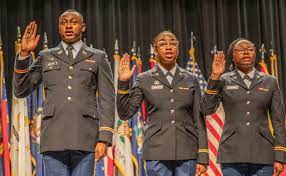Military College: Shaping Future Leaders
A military college is an institution that combines academic education with military training, producing well-rounded individuals who are prepared to become future leaders. These colleges offer a unique educational experience that goes beyond the traditional classroom setting, instilling discipline, leadership skills, and a strong sense of duty.
One of the primary goals of a military college is to develop character and leadership qualities in its students. From day one, cadets are immersed in an environment that demands discipline, integrity, and teamwork. They learn to follow orders, take responsibility for their actions, and understand the importance of self-discipline. These qualities are essential for success not only in the military but also in various professional fields.
Academically, military colleges offer a rigorous curriculum that emphasizes critical thinking, problem-solving skills, and intellectual growth. Students receive a well-rounded education in various disciplines such as mathematics, science, humanities, and social sciences. The small class sizes foster close relationships between students and professors, allowing for personalized attention and mentorship.
In addition to academic pursuits, physical fitness plays a crucial role in military college life. Cadets engage in regular physical training activities to improve their endurance, strength, and overall fitness levels. This focus on physical wellness helps develop resilience and instills a sense of personal responsibility for one’s health.
Military colleges also provide extensive leadership development programs. Cadets are given opportunities to take on leadership roles within their units or organizations on campus. They learn to lead by example, motivate others, make tough decisions under pressure, and effectively communicate with their peers.
Beyond the classroom and training grounds, military college life offers numerous extracurricular activities that promote personal growth and camaraderie among cadets. These activities include sports teams, clubs focused on specific interests or hobbies (such as debate clubs or honor societies), community service initiatives, and cultural events.
Upon graduation from a military college program, students have gained a wealth of experiences and skills that set them apart from their peers. Many military college graduates go on to serve in the armed forces, where they can apply their leadership skills and knowledge in practical settings. However, military college alumni also excel in various civilian careers, including business, politics, law enforcement, and public service.
In conclusion, military colleges provide a unique educational experience that combines academic excellence with military training. They shape future leaders by instilling discipline, leadership qualities, and a strong sense of duty. Graduates of military colleges are well-prepared for the challenges of both military service and civilian careers. If you are considering a path that combines education with character development and leadership training, a military college may be the perfect choice for you.
6 Essential Tips for Military College Success
- Research the military college you are interested in to make sure it is a good fit for your academic and career goals.
- Understand the differences between military colleges and traditional universities, such as structure, curriculum, and lifestyle.
- Learn about the admissions requirements and application process for each college you are considering.
- Consider the cost of attendance, including tuition, fees, housing costs, and other expenses associated with attending a military college.
- Develop a plan to finance your education through scholarships, grants, loans or other financial aid options available at the school of your choice.
- Make sure to take advantage of any special programs or benefits available to students attending military colleges such as ROTC programs and GI Bill benefits if applicable
Research the military college you are interested in to make sure it is a good fit for your academic and career goals.
Researching the Perfect Military College: Finding Your Fit
Choosing the right military college is a crucial step towards achieving your academic and career goals. With numerous options available, it’s essential to conduct thorough research to ensure that the college you choose aligns with your aspirations. Here’s why researching a military college is vital and how it can help you make an informed decision.
Firstly, researching a military college allows you to evaluate its academic programs. Look into the majors or fields of study offered and determine if they align with your interests and career aspirations. Consider the faculty’s expertise and their commitment to helping students succeed academically. Additionally, explore any unique academic opportunities, such as internships, research projects, or study abroad programs that may enhance your learning experience.
Secondly, delve into the military training aspect of the college. Understand the specific type of military training provided and consider if it matches your expectations and goals. Look into any specialized programs or leadership development initiatives offered by the institution. Assess whether their approach to military training aligns with your desired level of involvement in the armed forces.
Next, consider the campus culture and community. Researching a military college allows you to gain insights into student life beyond academics and training. Explore extracurricular activities, clubs, organizations, and sports teams available on campus. Consider whether these opportunities align with your interests or provide avenues for personal growth outside of academics.
Furthermore, take a close look at the college’s facilities and resources. Evaluate their libraries, laboratories, technology infrastructure, fitness centers, and other amenities that contribute to your overall learning experience. These resources can significantly impact your ability to excel academically while also maintaining a healthy work-life balance.
Don’t forget about financial considerations when researching a military college. Look into scholarships, grants, or financial aid options available specifically for military students or veterans. Understanding these financial aspects can help you plan for tuition costs effectively.
Lastly, reach out to current or former students, faculty members, or alumni of the military college you’re interested in. Their firsthand experiences can provide valuable insights into the college’s strengths, weaknesses, and overall culture. Engaging with these individuals can help you gain a deeper understanding of what it’s like to be a part of that institution.
In conclusion, researching a military college is crucial for finding the best fit for your academic and career goals. By evaluating academic programs, military training opportunities, campus culture, resources, and financial considerations, you can make an informed decision about which institution aligns with your aspirations. Remember to reach out to current or former students for their perspectives. With thorough research, you’ll be well on your way to finding the perfect military college that will shape your future success.
Understand the differences between military colleges and traditional universities, such as structure, curriculum, and lifestyle.
Understanding the Differences: Military Colleges vs. Traditional Universities
When considering higher education options, it’s essential to understand the differences between military colleges and traditional universities. While both offer valuable educational opportunities, they have distinct structures, curricula, and lifestyles that cater to different aspirations and goals.
Structure:
Military colleges have a unique structure that combines academic learning with military training. They operate on a regimented system, where students are organized into units and follow a strict hierarchy. This structure cultivates discipline, order, and a strong sense of responsibility among cadets. In contrast, traditional universities typically have a more flexible organizational structure with less emphasis on military-style discipline.
Curriculum:
The curriculum at military colleges is designed to provide a comprehensive education while incorporating military-specific subjects. Alongside standard academic courses, cadets receive training in leadership development, physical fitness, and military strategy. The goal is to produce well-rounded individuals who are academically proficient and possess the necessary skills for future leadership roles in the armed forces or civilian careers requiring strong leadership qualities.
Traditional universities offer a broader range of academic programs across various disciplines. Students can choose from an array of majors and minors tailored to their interests and career aspirations. While leadership development may still be available through extracurricular activities or specialized programs at traditional universities, it is not as central to the overall curriculum as it is in military colleges.
Lifestyle:
The lifestyle at military colleges differs significantly from that of traditional universities. Military college students live in barracks or dormitories on campus and adhere to strict rules and regulations governing their daily routines. They typically wear uniforms throughout the week and participate in physical training activities regularly.
On the other hand, traditional university students experience more freedom in terms of living arrangements and clothing choices. They have greater flexibility in managing their schedules and can participate in various social activities outside of their academic commitments.
Choosing Between Military College and Traditional University:
Deciding between a military college or a traditional university depends on individual preferences, career goals, and personal values. If you have a strong desire to serve in the military and aspire to leadership roles within the armed forces, a military college can provide the specialized training and environment needed to excel.
However, if you are seeking a broader range of academic options, more flexibility in lifestyle choices, or are unsure about committing to a military career, a traditional university may be better suited for you. Traditional universities offer diverse academic programs and allow for exploration of different fields of study.
Ultimately, it is crucial to thoroughly research and consider your long-term goals and aspirations before making a decision. Understanding the differences between military colleges and traditional universities will help you make an informed choice that aligns with your educational and career objectives.
Learn about the admissions requirements and application process for each college you are considering.
When considering attending a military college, one crucial tip is to thoroughly research and understand the admissions requirements and application process for each college you are considering. This step is essential to ensure that you meet all the necessary criteria and can submit a strong application.
Each military college may have specific requirements that applicants must fulfill. These requirements can include academic prerequisites, physical fitness standards, character evaluations, and medical examinations. By familiarizing yourself with these requirements early on, you can adequately prepare yourself to meet them.
Start by visiting the websites of the military colleges you are interested in. Most institutions provide detailed information about their admissions process, including specific academic benchmarks, standardized test scores (such as the SAT or ACT), and any additional documents or essays they may require. Take note of any deadlines and make sure to plan accordingly.
It is also beneficial to reach out to admissions counselors or representatives from each military college. They can provide valuable insights into the application process and answer any questions you may have. Building a relationship with these individuals demonstrates your genuine interest in attending their institution and allows you to get personalized guidance throughout the application journey.
In addition to meeting academic requirements, military colleges often place great emphasis on leadership potential and character development. Highlight any leadership roles or community service experiences you have had in your application materials. This will demonstrate your commitment to service and showcase your ability to thrive in a disciplined environment.
Lastly, proofread your application materials thoroughly before submitting them. Pay attention to grammar, spelling errors, and overall clarity of your written statements. Ask someone else – such as a teacher or mentor – to review your application as well for additional feedback.
By learning about the admissions requirements and carefully following the application process for each military college you are considering, you increase your chances of presenting a strong application that stands out among other candidates. Taking this proactive approach demonstrates your dedication and commitment right from the start – qualities that align with what military colleges seek in their future cadets and leaders.
Consider the cost of attendance, including tuition, fees, housing costs, and other expenses associated with attending a military college.
Consider the Cost: Financial Planning for Military College
When exploring the option of attending a military college, it is crucial to consider the cost of attendance. While the benefits of a military college education are undeniable, it is essential to have a clear understanding of the financial obligations associated with this choice.
Tuition and fees are often the most apparent costs when considering college expenses. Military colleges typically have their own fee structures, which may differ from traditional universities. These fees can include tuition, technology fees, lab fees, and other academic-related expenses. It is crucial to research and understand these costs to make an informed decision.
Housing costs are another significant factor to consider. Military colleges often require students to live on campus during their enrollment. While this can provide a unique community experience, it also comes with its own price tag. Room and board expenses vary depending on factors such as location, type of accommodation, and meal plans. Understanding these costs will help you plan your budget effectively.
Additionally, there are other expenses associated with attending a military college that should be taken into account. These can include textbooks and supplies, uniforms or dress code requirements, physical fitness gear or equipment, transportation costs if commuting is necessary, and personal expenses for day-to-day living.
To alleviate some of these financial burdens, it is important to explore available financial aid options and scholarships specifically tailored for military college students. Many military colleges offer scholarships based on academic merit or financial need. Additionally, federal aid programs such as grants or student loans may be applicable.
Creating a comprehensive budget that takes into account all aspects of attending a military college will help you determine if it is financially feasible for you and your family. It’s essential to consider not only the immediate costs but also the long-term implications on your financial well-being after graduation.
While cost should be an important consideration in your decision-making process, remember that attending a military college offers unique opportunities for personal growth, leadership development, and career prospects. The investment you make in your education can yield invaluable returns in terms of knowledge, skills, and future opportunities.
In conclusion, when considering attending a military college, it is crucial to consider the cost of attendance beyond tuition and fees. Take into account housing costs, additional expenses associated with attending the college, and explore available financial aid options. By carefully evaluating the financial aspects of attending a military college, you can make an informed decision that aligns with your educational and financial goals.
Develop a plan to finance your education through scholarships, grants, loans or other financial aid options available at the school of your choice.
Develop a Plan to Finance Your Military College Education
Embarking on a journey at a military college is an exciting and fulfilling endeavor. However, it’s important to consider the financial aspect of your education. Fortunately, there are numerous scholarships, grants, loans, and other financial aid options available to help make your military college dreams a reality.
The first step in financing your military college education is to research and explore the financial aid options offered by the school of your choice. Most military colleges have dedicated financial aid offices that can provide information on scholarships specific to military students or veterans. These scholarships can be based on academic achievements, leadership qualities, or specific fields of study.
Additionally, federal and state governments offer various grants and loans that can assist in covering tuition costs. The Free Application for Federal Student Aid (FAFSA) is a crucial document to complete as it determines your eligibility for federal grants and loans. Be sure to submit the FAFSA early to maximize your chances of receiving financial assistance.
Apart from institutional and government aid, there are also external organizations that offer scholarships specifically for military students or veterans. These organizations recognize the sacrifices made by individuals in service and aim to support their educational pursuits.
When developing your plan for financing your military college education, consider all available options. Scholarships are ideal as they do not require repayment, but grants and loans can also be viable choices depending on your circumstances. It’s essential to carefully review the terms and conditions of any loan before committing.
In addition to exploring financial aid options, it’s wise to create a budget that outlines all potential expenses during your time at the military college. This includes tuition fees, housing costs, textbooks, meals, transportation, and personal expenses. By understanding these costs upfront, you can better plan how much assistance you will need.
Remember that applying for financial aid requires careful attention to deadlines. Stay organized by keeping track of application deadlines for scholarships and submitting required documentation promptly. The financial aid office at your chosen military college can provide guidance throughout the process and answer any questions you may have.
In summary, financing your military college education requires careful planning and consideration. Take advantage of the numerous scholarships, grants, loans, and other financial aid options available to military students. Research the offerings specific to your chosen military college and explore external organizations that support educational pursuits for veterans. Develop a budget to understand your expenses and stay organized by adhering to application deadlines. With a well-thought-out plan, you can make your military college dreams a reality without undue financial burden.
Make sure to take advantage of any special programs or benefits available to students attending military colleges such as ROTC programs and GI Bill benefits if applicable
Maximizing Opportunities: Special Programs and Benefits at Military Colleges
When considering attending a military college, it’s essential to be aware of the special programs and benefits available to students. These opportunities can greatly enhance your educational experience and provide valuable support as you pursue your academic and military goals.
One significant program to take advantage of is the Reserve Officer Training Corps (ROTC). ROTC offers students the chance to receive military training while simultaneously earning a college degree. Through ROTC, students develop leadership skills, receive financial assistance, and have the opportunity to commission as officers in the armed forces upon graduation. The program provides hands-on training and prepares students for future military service or civilian careers.
Another crucial benefit for eligible individuals attending military colleges is the GI Bill. The GI Bill offers financial assistance to veterans, active duty service members, and their dependents. This support can help cover tuition costs, provide a housing allowance, offer funds for books and supplies, and even assist with relocation expenses. Taking advantage of these benefits can significantly alleviate financial burdens while pursuing higher education.
Additionally, military colleges often have specialized resources designed specifically for their student population. These resources may include counseling services tailored to address unique challenges faced by military-connected individuals or career development programs that focus on transitioning from college into various professional fields. These specialized programs can provide guidance and support throughout your academic journey.
It’s important to thoroughly research and understand the specific requirements and eligibility criteria for these programs or benefits at your chosen military college. Reach out to admissions offices or designated points of contact who can provide accurate information regarding application processes, deadlines, and any additional steps you need to take.
By making use of these special programs and benefits, you can maximize your opportunities as a student at a military college. Whether it’s participating in ROTC for comprehensive training and commissioning opportunities or utilizing the GI Bill for financial assistance, these resources are designed to support your success both academically and militarily.
Remember, the decision to attend a military college is not only about the education you receive but also the opportunities and benefits available to you. Take advantage of these programs and benefits, as they can help shape your future and provide a solid foundation for your career.




